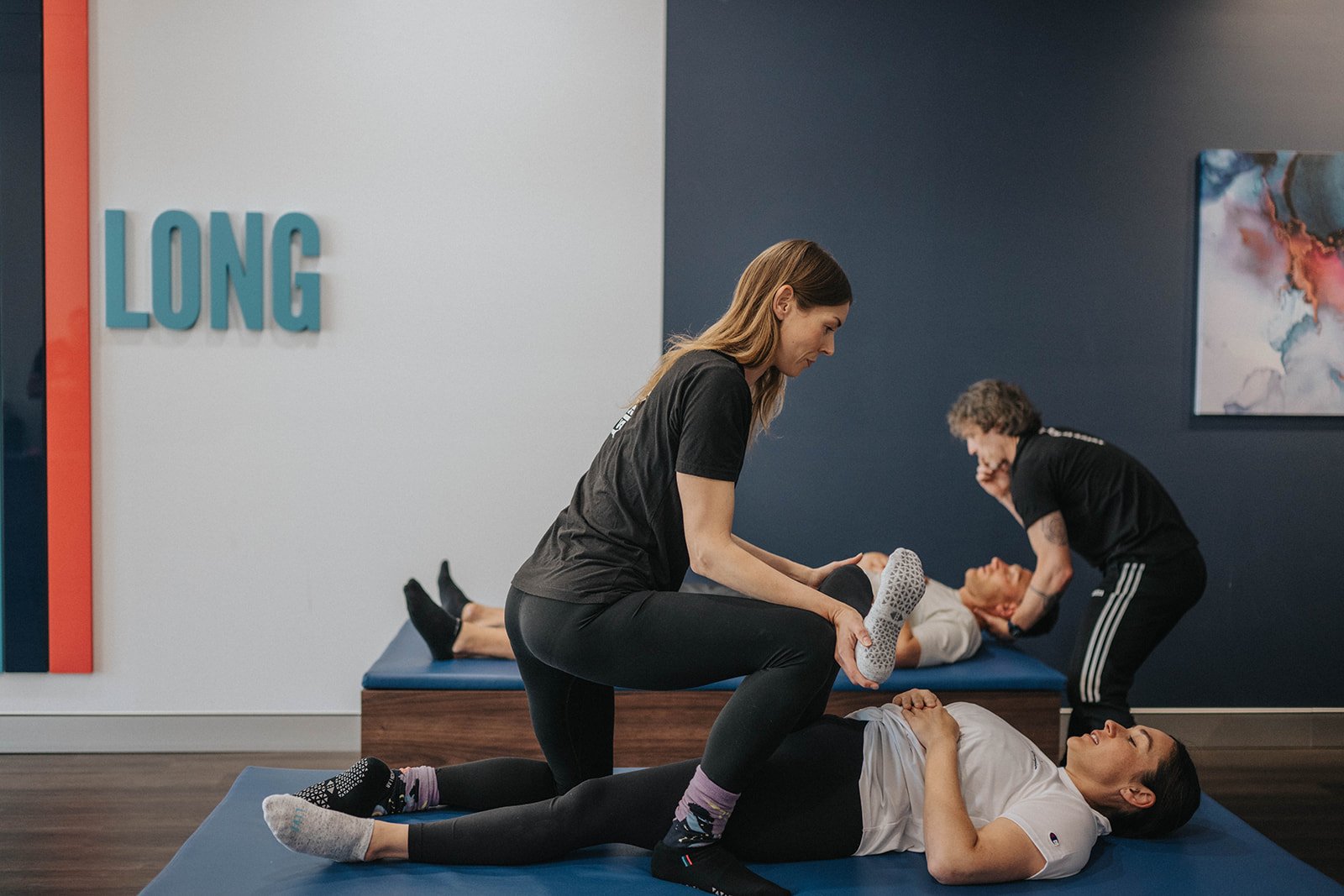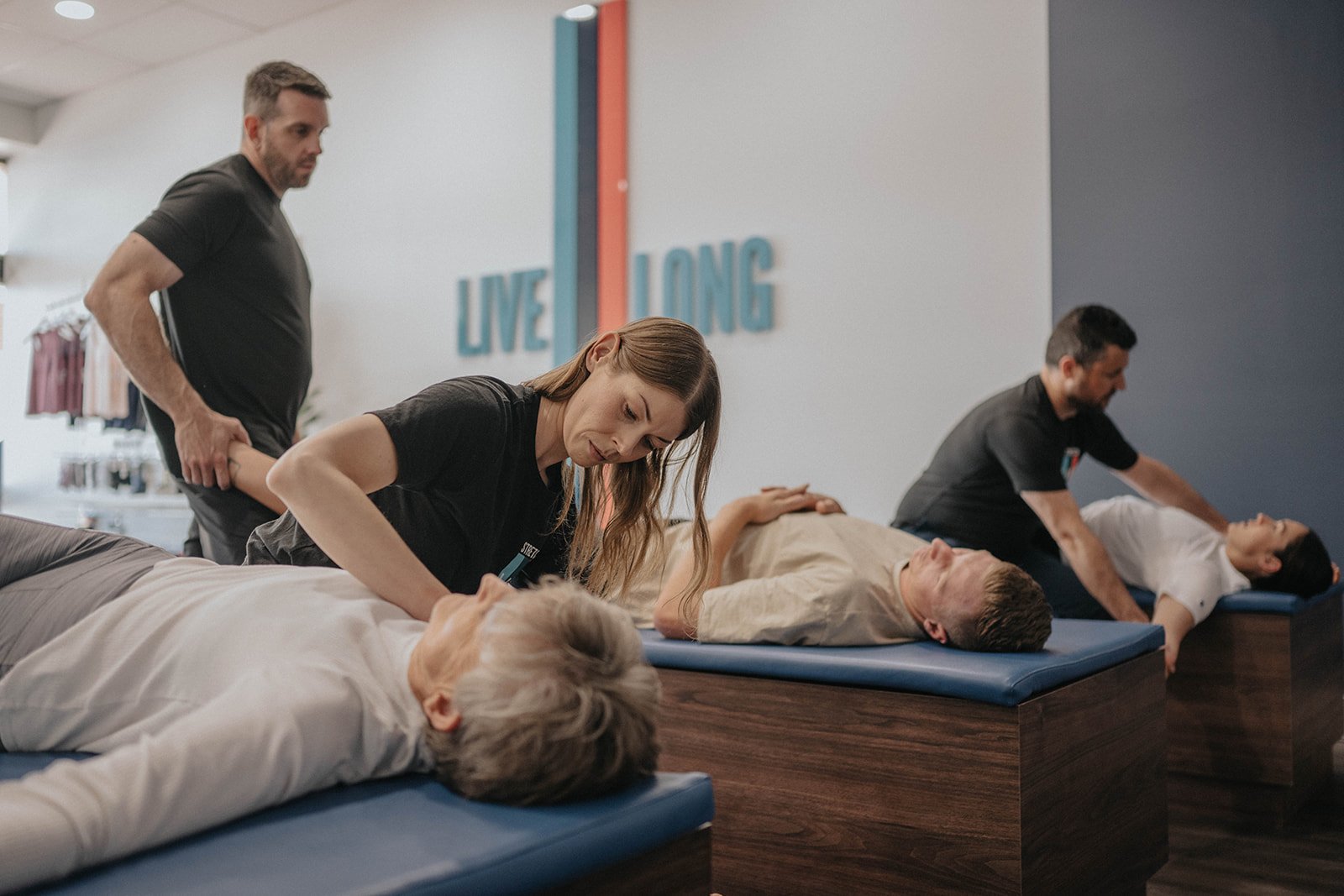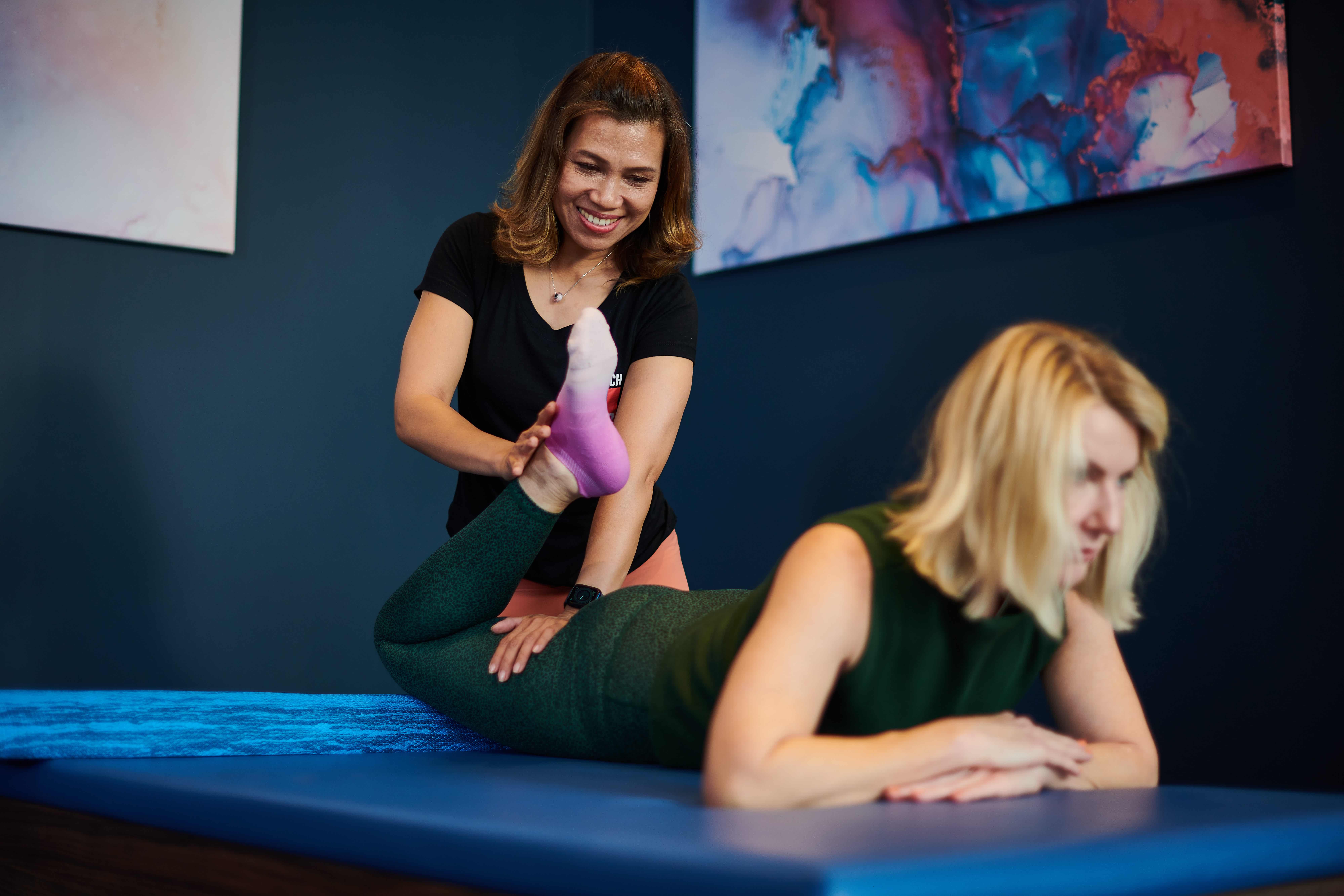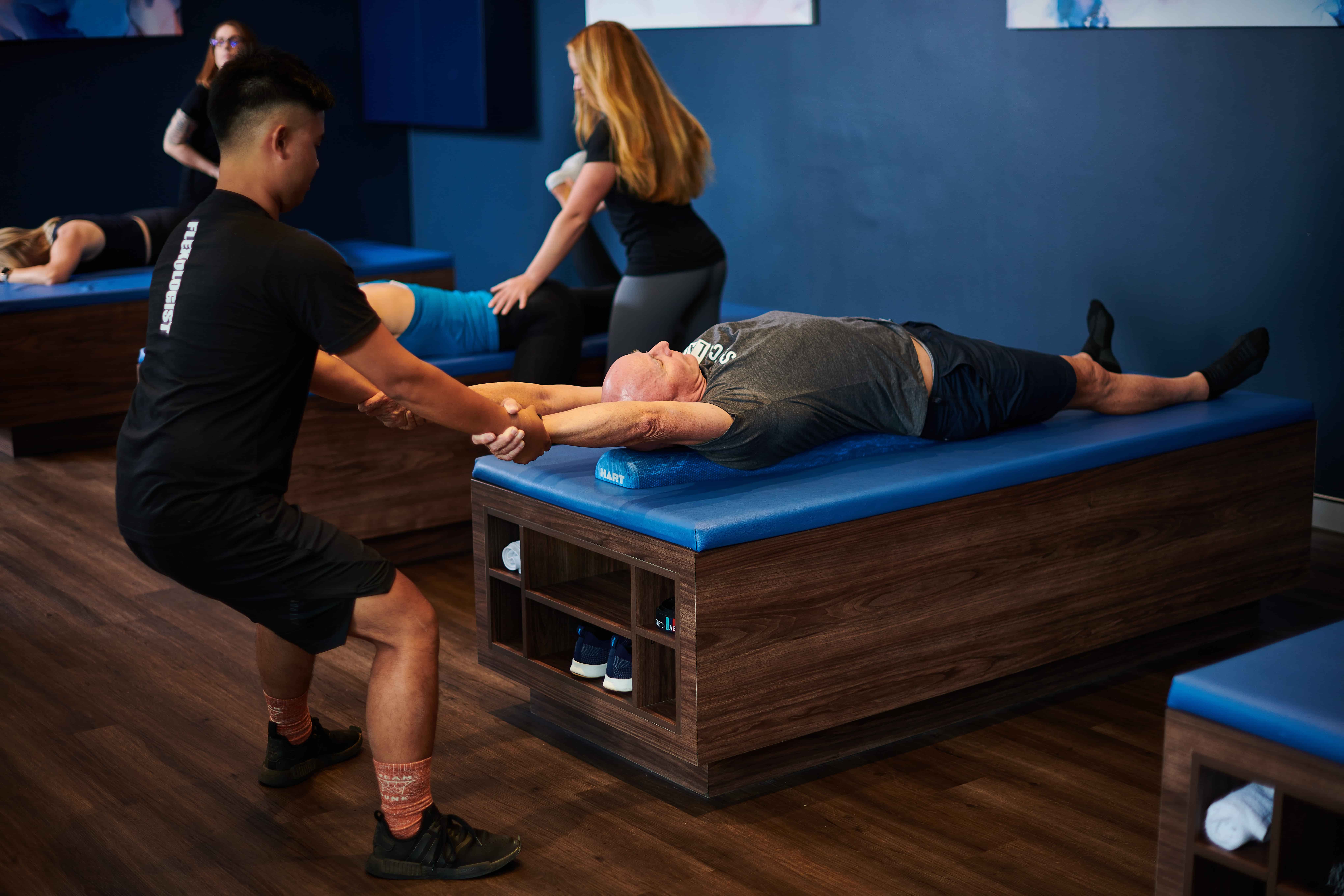Are you tired of feeling stiff, inflexible, and limited in your range of motion? It's time to join the stretch revolution at Stretch Lab and discover the incredible benefits of assisted stretching. In this article, we'll delve into the world of assisted stretching and explain how it can transform your flexibility, mobility, and overall well-being.
What is Assisted Stretching?
Assisted stretching is a form of stretching that involves working with a trained professional who guides you through a series of stretches and exercises designed to target specific muscle groups and improve your flexibility. At StretchLab, they’re called Flexologists. Unlike traditional stretching, where you do it on your own, assisted stretching allows for a deeper, more effective stretch with the help of a partner or a stretching device.
Assisted stretching can be performed on various parts of the body, including the legs, arms, back, and shoulders. The goal is to lengthen the muscles and increase the range of motion by applying gentle pressure and assistance to the targeted muscles. This can help to alleviate muscle tightness, improve joint mobility, and enhance overall flexibility.
Benefits of Assisted Stretching
Assisted stretching offers a wide range of benefits for individuals of all fitness levels and lifestyles. Here are some of the key advantages of incorporating assisted stretching into your routine:
Increased Flexibility and Range of Motion
One of the primary benefits of assisted stretching is the significant improvement in flexibility and range of motion. By working with a trained professional, you can achieve deeper stretches that target specific muscle groups more effectively. This can lead to increased muscle length and improved joint mobility, allowing you to move more freely and comfortably.
Improved Blood Circulation
Assisted stretching helps to improve blood circulation throughout the body. As you stretch and elongate your muscles, blood flow increases, delivering vital nutrients and oxygen to the muscles and tissues. This can promote faster recovery after exercise, reduce muscle soreness, and enhance overall performance.
Reduced Muscle Tension and Pain
If you suffer from muscle tightness or chronic pain, assisted stretching can provide relief. By targeting specific muscle groups and applying gentle pressure, assisted stretching helps to release muscle tension and reduce pain. This can be particularly beneficial for individuals with conditions such as back pain, neck pain, or tight hips.
Enhanced Relaxation and Stress Relief
Assisted stretching not only benefits your physical well-being but also your mental health. The stretching process encourages relaxation and promotes the release of endorphins, the body's natural feel-good hormones. This can help to alleviate stress, improve mood, and enhance overall mental well-being.
Injury Prevention
Regular assisted stretching can play a crucial role in injury prevention. By increasing flexibility and improving muscle balance, assisted stretching helps to reduce the risk of muscle strains, sprains, and other types of injuries. It can also improve postural alignment, ensuring that your body is in optimal condition for physical activities.
How Does Assisted Stretching Work?
Assisted stretching involves a series of techniques and exercises that are performed with the help of a Flexologist. The stretching session typically begins with a warm-up to prepare the muscles for the stretches to come. The professional will then guide you through a series of stretches, targeting specific muscle groups based on your individual needs and goals.
During the assisted stretching session, the flexologist may use various techniques to enhance the effectiveness of the stretches. These techniques can include applying gentle pressure, using stretching aids or devices, and providing verbal cues to help you relax and focus on the stretch.
The duration and intensity of the stretches will depend on your fitness level, flexibility, and specific requirements. The professional will ensure that the stretches are performed safely and within your comfort zone.
Assisted Stretching Techniques
Assisted stretching employs various techniques to achieve optimal results. Here are some commonly used techniques in assisted stretching:
PNF Stretching
PNF, or proprioceptive neuromuscular facilitation, is a technique that involves alternating between stretching and contracting the targeted muscle group. This technique helps to improve muscle flexibility and increase the range of motion by capitalizing on the body's natural reflexes.
Active Isolated Stretching
Active isolated stretching involves holding a stretch for a short period, typically 1-2 seconds, and then releasing it. This technique helps to improve flexibility and range of motion by engaging the target muscle group in a controlled manner.
Passive Stretching
Passive stretching is a technique where the professional applies gentle pressure to stretch the targeted muscle group while you relax. This technique allows for a deeper stretch and can help to improve flexibility and joint mobility.
Static Stretching
Static stretching involves holding a stretch for an extended period, typically 15-60 seconds, without any movement. This technique helps to lengthen the muscles and improve flexibility over time.
Assisted Stretching vs. Traditional Stretching
While traditional stretching can provide some benefits, assisted stretching offers several advantages that make it a more effective approach to improving flexibility and range of motion. Here's how assisted stretching compares to traditional stretching:
Deeper Stretch
Assisted stretching allows for a deeper stretch compared to traditional stretching. The assistance provided by a trained professional or stretching device helps to achieve a more significant elongation of the muscles, resulting in improved flexibility and joint mobility.
Targeted Muscle Groups
Assisted stretching allows for a more targeted approach to stretching specific muscle groups. A Flexologist can identify tight or weak areas and tailor the stretching routine accordingly, ensuring that you get the most out of each stretch.
Increased Effectiveness
The guidance and assistance provided during assisted stretching sessions ensure that you perform the stretches correctly and effectively. This helps to maximize the benefits and minimize the risk of injury.
Personalized Approach
Assisted stretching takes into account your individual needs and goals. The professional will assess your flexibility, range of motion, and any specific areas of concern to develop a personalized stretching routine that addresses your unique requirements.
Motivation and Accountability
Working with a trained professional provides motivation and accountability, making it easier to establish a consistent stretching routine. The guidance and support from a professional can help you stay on track and achieve your flexibility goals.
.jpg?width=1600&height=1067&name=_DSC2903%20(1).jpg)
Common Misconceptions about Assisted Stretching
There are several misconceptions surrounding assisted stretching that can prevent individuals from reaping its benefits. Let's debunk some of these common misconceptions:
Assisted Stretching is Only for Athletes
While assisted stretching is highly beneficial for athletes, it is not exclusively reserved for them. Assisted stretching can benefit individuals of all fitness levels and lifestyles.
Assisted Stretching is Painful
Assisted stretching should not be painful. While you may feel some discomfort during a stretch, it should never be unbearable or cause sharp pain. A trained professional will ensure that the stretches are performed within your comfort zone and will adjust the intensity accordingly.
Assisted Stretching is a Quick Fix
Assisted stretching is not a quick fix for flexibility or mobility issues. It requires consistency and dedication to achieve long-term results. Regular assisted stretching sessions, combined with a balanced fitness routine, proper nutrition, and adequate rest, can help you achieve and maintain optimal flexibility and range of motion.
Join the stretch revolution today and unlock the full potential of your body. Assisted stretching at Stretch Lab offers a wide range of benefits, including increased flexibility, improved blood circulation, reduced muscle tension, and enhanced relaxation. Whether you're an athlete looking to enhance your performance, a desk warrior wanting to alleviate tightness and discomfort, or simply someone who wants to improve their overall flexibility, assisted stretching has something to offer you.
New to Stretching sessions? Don’t sweat it, check out our first timers experience!
Book a stretching class with one of our highly trained Flexologists across Australia, including Claremont, Currambine, Balgowlah, Highgate, South Perth, Five Dock and many more!


.jpg?width=8087&height=5392&name=106_STRETCHLAB_20220205-_DSC8717%20(1).jpg)



.jpg?width=600&name=077_STRETCHLAB_20220205-_DSC8625%20(1).jpg)
.jpg?width=600&name=StretchLab_%20(120).jpg)